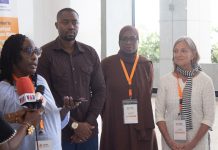By Ndey Sowe
Abdou Aziz Ceesay, Director of Social and Behavioural Change Communication (SBCC) at the National Nutrition Agency (NaNA), called for government, lawmakers, and the private sector’s commitment to establish breastfeeding friendly workplaces.
“Breastfeeding can be challenging when parents are not fully informed and supported. Prioritization and support of breastfeeding has the potential to reduce the growing climate impact of artificial infant feed supply chains,” he said on Wednesday, 27th of August, 2025 during the inauguration of the Kanifing General Hospital refurbished staff crèche, providing working mothers the opportunity to breastfeed their children while carrying out their duties.
The Gambia’s commemoration of the 2025 World Breastfeeding Week (WBW), a global campaign held annually from August 1 to 7. Unlike many countries, The Gambia has dedicated the entire month of August to raising awareness about breastfeeding, underscoring its importance to both child and maternal health.
The theme for this year is “Prioritize Breastfeeding: Create Sustainable Support System”, focusing on the environment and climate change.
Mr Ceesay added: “breastfeeding is natural, providing renewable food that is environmentally safe. It is produced and delivered without pollution, packaging or waste thus creating a sustainable solution that is good for the plane and its people”.
He added that this year’s celebration outlines roles and connects the actors in Warm Chain of Support for Breastfeeding, adding that this is a concept that emphasizes the importance of placing the needs of the mother and child in the centre of all actions to support breastfeeding.
“Operationalization of this concept can be done through concerted supportive actions coordinated and connected at all levels i.e. national, health, workplace and community to create breastfeeding-friendly environment together at all times,” Mr Ceesay highlighted.
The World Alliance for Breastfeeding Action, the World Health Organization, and UNICEF established the World Breastfeeding Week initiative to promote early initiation of breastfeeding, exclusive breastfeeding for the first six months of a child’s life and continued breastfeeding up to 2 years or beyond.
However, Mr Ceesay highlights some benefits, saying that providing vital nutrients, protecting infarcts from fetal disease like pneumonia, reducing food insecurity, and fostering growth and development.
Mr Ceesay said: “every child should be breastfed exclusively for the first six months of life, followed by continued breastfeeding with appropriate complementary food for up to two years and beyond regardless of background or status”.
According to the Convention on the Rights of the Child, every infant and child has the right to good nutrition, reflecting on this year’s theme, the World Alliance for Breastfeeding Action has reported that the global breastfeeding rate at six months stood at 48% in 2023, close to World Health Assembly target of 50% by 2025.
Meanwhile, to ensure positive growth and reaching the 2030 target of 70% exclusive breastfeeding at six months, Mr Ceesay stresses the participation of each actor that makes up the warm chain is crucial.
In 2022, 45% of child deaths globally were linked to undernutrition. According to the World Health Organization estimates, 149 million children under the age of five are stunted (too short for age), 45 million are wasted (too thin for height), and 37 million are overweight or obese. Approximately, 820,000 children’s lives could be saved every year, if all children 0-23 months were optimally breastfed.
Through NaNA whose job is to coordinate all nutrition-related activities, Mr Ceesay said The Gambia has established policies and strategies to protect, promote and support breastfeeding.
He added that the enactment of the Nutrition Act 2024, and the development of periodic review of the National Nutrition Policy and the Multi-Sectoral Nutrition Strategic Plan, enforcement of the Breastfeeding Regulations 2006, implementation of the Baby Friendly Hospital Initiative Program, Baby Friendly Community Initiative, and the high-level stakeholders involvement in promoting breastfeeding are among the strategies to protect, promote and support breastfeeding.
Mr Ceesay therefore assured that during the course of the whole month of August NaNA and partners will intensify and diversify Social and Behavioural Change Communication engagements, which includes press conferences to inform the general public about the importance of breastfeeding and subscribe to creating sustainable support systems.



















